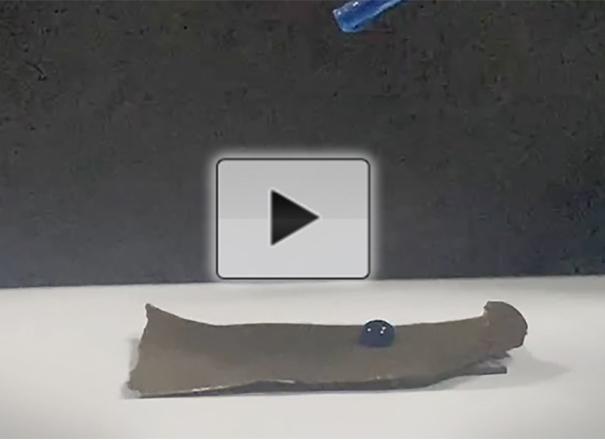
Credit: American Chemical Society
Summertime is here, and that often means long, lazy days at the beach, water skiing and swimming. Life jackets and swimsuits are essential gear for these activities, but if not dried thoroughly, they can develop a gross, musty smell. Now, researchers reporting in ACS Applied Materials & Interfaces have developed a one-step method to create a buoyant cotton fabric for these applications that is also oil- and water-repellant. Watch a video of the fabric here.
Waterproof and oil-proof fabrics are in high demand for recreational water activities because of their low drag and self-cleaning properties. And while cotton is a popular fabric, it’s hydrophilic, so most liquids and dirt can easily mess it up. To improve cotton’s impermeability, previous researchers developed superamphiphobic coatings that were extremely water- and oil-repellant. But because they required multiple time-consuming steps to apply, these coatings were impractical for large-scale manufacturing. Others incorporated nanoparticles into their formulas, but there are concerns about these particles sloughing off and potentially harming the environment. Xiao Gong and Xinting Han wanted to develop a simple way to make a coating for cotton fabric so it would have superb liquid-repulsion properties and hold up in many challenging circumstances.
The researchers optimized a one-step process for a liquid-proof coating by mixing dopamine hydrochloride, 3-aminopropyltriethoxysilane and 1H,1H,2H,2H-perfluorodecyltriethoxysilane with a piece of cotton fabric for 24 hours. The three-part solution developed into a uniform, dark brown coating on the fabric. In tests, the treated cotton was impervious to many common liquids. The new solution also coated inner cotton fibers, making them liquid proof, too. In other tests, only strong acid and repeated washings reduced the material’s water and oil resistance, respectively. Treated fabric soiled with fine sand was easy to clean with water, whereas water only wetted the control version. Finally, the material stayed afloat with up to 35 times its weight on it because of nanoscale air pockets that formed where the coating attached to the fabric, the researchers explain. They say their durable cotton fabric has great potential for applications where drag reduction and increased buoyancy are important, including swimsuits and life jackets.
###
The authors acknowledge funding from the National Natural Science Foundation of China and the Opening Project of State Key Laboratory of Polymer Materials Engineering (Sichuan University).
The abstract that accompanies this paper is freely available here.
For more of the latest research news, register for our upcoming meeting, ACS Fall 2021. Journalists and public information officers are encouraged to apply for complimentary press registration by emailing us at [email protected].
The American Chemical Society (ACS) is a nonprofit organization chartered by the U.S. Congress. ACS’ mission is to advance the broader chemistry enterprise and its practitioners for the benefit of Earth and all its people. The Society is a global leader in promoting excellence in science education and providing access to chemistry-related information and research through its multiple research solutions, peer-reviewed journals, scientific conferences, eBooks and weekly news periodical Chemical & Engineering News. ACS journals are among the most cited, most trusted and most read within the scientific literature; however, ACS itself does not conduct chemical research. As a leader in scientific information solutions, its CAS division partners with global innovators to accelerate breakthroughs by curating, connecting and analyzing the world’s scientific knowledge. ACS’ main offices are in Washington, D.C., and Columbus, Ohio.
To automatically receive news releases from the American Chemical Society, contact [email protected].
Follow us: Twitter | Facebook
Media Contact
Katie Cottingham
[email protected]




